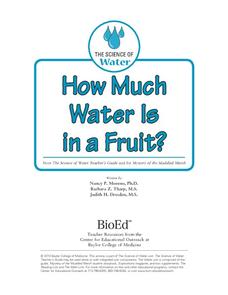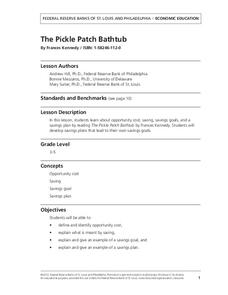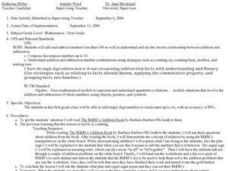Perkins School for the Blind
Baseball
Baseball is an American pastime, super fun to play, and can be made accessible to learners with visual impairments. Instead of taking to the ball field, your class can learn the rules of the game by playing a small three-dimensional...
Baylor College
How Much Water Is in a Fruit?
Compare the volume of an orange to the volume of liquid that can be extracted out of it. Also compare the mass of an apple before and after it has been dried out. In both of these activities, children find that there is an appreciable...
Baylor College
How Much Water Do Humans Need?
Physical or life science learners measure the amounts of water eliminated by intestines and the urinary system, and the amounts lost via respiration and perspiration. In doing so, they discover that the body's water must be replenished...
Baylor College
How Do We Use Water?
Send youngsters home to survey how they use water in their homes. Then bring them together to discuss which uses are essential for our health and which are not. A helpful video offers teaching tips for this lesson plan, and a...
Baylor College
They're Everywhere: Bacteria
Totally gross out your class with the eighth lesson in this series on food science. Explore the microscopic world of bacteria by taking swabs of different classroom objects and growing colonies in petri dishes. An engaging activity that...
Baylor College
Need or Want?
Even as adults it can be hard to distinguish needs from wants. Using pictures of common, everyday items, children make a pocket chart separating the objects they need from those that they want. Discuss their choices, explaining that...
Baylor College
What is Air? Pre-Assessment
First, estimate existing knowledge about air with a class discussion. Then, hand out a 10-question pre-assessment quiz to record how much pupils know to compare to their knowledge later. This will also give mini meteorologists the...
Baylor College
What's That Food?
Get things cooking with the first lesson in this series on the science of food. Working in small groups, young scientists make and record observations about different mystery foods. These descriptions are then shared with the class and...
Baylor College
Air and Breathing
Blow some bubbles and learn how living things need air in the eighth lesson of this series. Young scientists investigate this important gas by observing bubbles and monitoring their own breathing. A simple and fun activity that raises...
Baylor College
Healthy Homes
Meant to follow a instructional activity about how concentrated air particles can be inside of a building, this resource gets individuals to assess the possible air pollutants in their own homes. They take home a worksheet and circle...
National Christmas Tree Association
Merry Christmas, Geraldine
If you're reading the story "Merry Christmas, Geraldine" by Holly Keller, this is a fantastic cross-curricular resource to use. Complete with activities for language arts, science, social studies, art, and math, you'll get the most out...
American Museum of Natural History
Trip Up Your Brain
Sometimes different parts of the brain disagree. See what this disagreement looks like using a remote learning resource to experience how brains often take shortcuts. Pupils complete the activity, observe their results, and then read...
Federal Reserve Bank
The Pickle Patch Bathtub
What do your pupils want to save up their money for? Based around the book The Pickle Patch Bathtub, this lesson covers opportunity cost, saving, and spending. Learners participate in a discussion and practice making their own savings...
Curated OER
Everyday Heroes You Can Be One, Too
Pupils listen to a read aloud of Alan Baker's, White Rabbit's Color Book while identifying shapes and lines throughout the book. They use shapes and different types of lines to create a bunny of their own. They must use five shapes to...
Curated OER
Counting on Frank
Eighth graders read a book "Counting on Frank" with a partner. Using the text, they identify eight clues and use their mathematical reasoning in real-life situations. They participate in a game and turn in a notebook in which they write...
Curated OER
Shapes
Learners participate in a number of hands-on shape-related activities. They match and sort shapes by attribute, read books about shapes, complete shape art projects and explore and compare parts of shapes.
Curated OER
So Many Cats!
First graders listen to the book, So Many Cats, and discuss the number of cats in the story. They demonstrate simple addition problems using cat counters and a work mat in the shape of a house.
Curated OER
Geo Shapes
First graders listen as the book, "Try It With Triangles" is read to the class. They name the geometric shapes that they see in the story and view the Shape Vocabulary Cards as they name them from the book. They then cut out the...
Curated OER
Classroom Supplies
Challenge young mathematicians to buy classroom supplies by staying within the means of a $1,000 budget. The mathematical activity provides learners with the opportunity to decide what items from the supply list would benefit a class of...
Curated OER
Learning about Fibonacci
In this learning about Fibonacci worksheet, students read about Leonardo Fibonacci and his contribution to mathematics, then study the pattern of Fibonacci numbers, in math and in nature.
Curated OER
What's The Story?
Teams of learners integrate reading, writing, math, social studies, and science in this simple, yet effective lesson plan. They work in groups in order to solve a ten-step problem which requires internet research, the use of a...
Curated OER
One-digit Division
Young mathematicians read the book, The Doorbell Rang. They examine the necessity of division in everyday life, such as cooking and sharing. They use paper cookies to construct equivalent sets.
Curated OER
M & M Addition
Eat your math manipulatives, are you serious? Yup, Learners listen to the story The M & M's Addition book, add single digit numbers to reach sums up to six, and demonstrate addition and subtraction number combinations using several...
Curated OER
Word Problems: Addition and Subtraction
Word problems build reading comprehension and problems solving skills. Here is a set of 10 basic word problems that involves both addition and subtraction using the numbers 1-10.

























